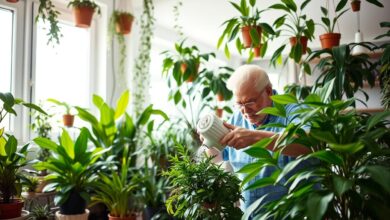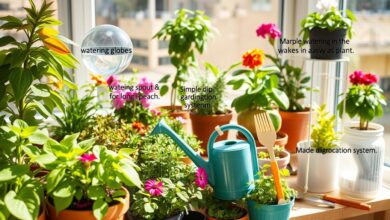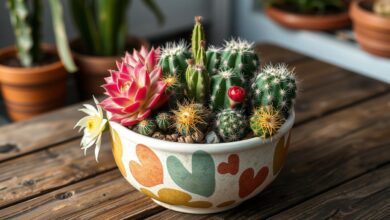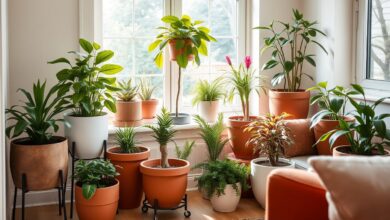Gardening for Seniors: A Joyful Way to Stay Active and Healthy
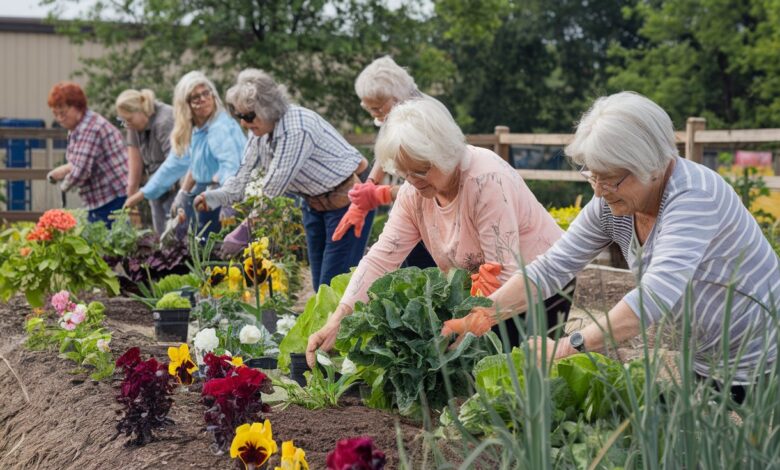
Gardening is a simple yet powerful way for seniors to boost their health and happiness. Whether it’s planting flowers on the porch, working in a community garden, or growing a few vegetables, gardening offers countless benefits. It’s not just about growing plants; it’s also a gentle form of exercise that helps burn calories, lower stress, and strengthen the immune system. Gardening can lift spirits, improve nutrition, and even provide chances to connect with others.
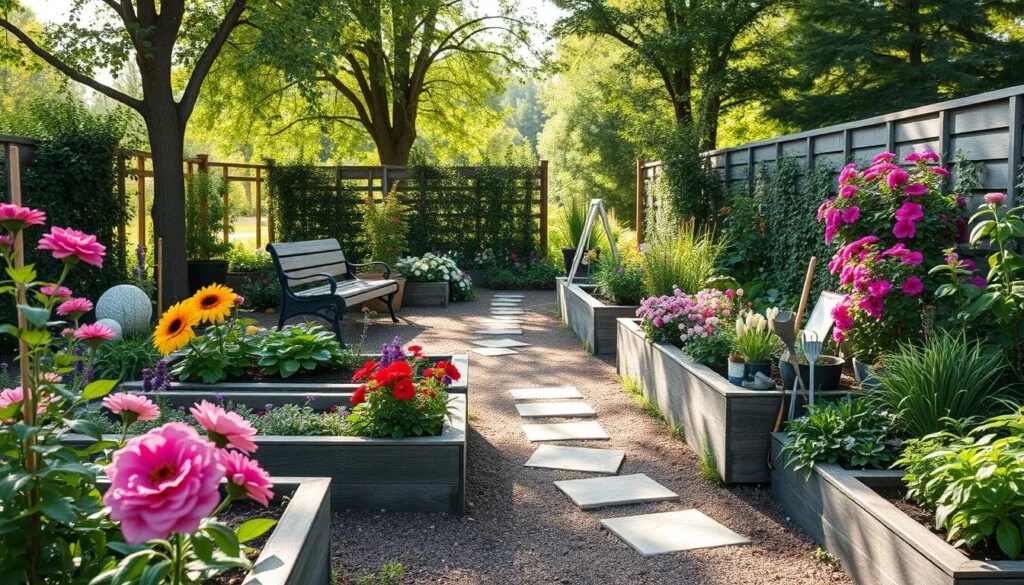
Even seniors with small spaces or mobility challenges can enjoy gardening with a few helpful tools and easy adjustments. According to the CDC, seniors can burn about 330 calories with just one hour of light gardening—more than walking at a moderate pace. Research also shows that gardening can lower stress levels, reduce anxiety, and even lower blood pressure. Plus, a study suggests that daily gardening might lower the risk of dementia by 36%, thanks to the hand-eye coordination and mental focus it requires.
It’s a relaxing and rewarding way to stay active, no matter your age!
Table of Contents
The Multifaceted Benefits of Gardening for Seniors
Gardening is a versatile activity that offers a wealth of physical, mental, and emotional benefits for seniors. From improving strength and flexibility to reducing stress and boosting mood, this cherished pastime can enhance the overall well-being of older adults.
Health Advantages
Gardening provides seniors with valuable physical exercise that strengthens muscles, enhances motor skills, and boosts cardiovascular health. Activities like digging, planting, and watering can burn up to 400 calories per hour, promoting weight management and improved circulation. Regular gardening also helps seniors maintain balance and coordination, reducing the risk of falls and injuries.
Additionally, gardening can have a positive impact on cognitive function. The planning, problem-solving, and attention required in gardening tasks can help improve memory and cognitive abilities in older adults. Furthermore, the soothing and calming nature of gardening can lower stress and anxiety levels, supporting overall emotional well-being.
Mental and Emotional Rewards
The sense of purpose, pride, and accomplishment that comes from nurturing plants and watching them grow can be incredibly fulfilling for seniors. Gardening also encourages social interaction and community engagement, combating loneliness and fostering a sense of belonging. Participation in community gardens, for instance, has been shown to enhance mental benefits and overall health and well-being among older adults.
Gardening can also have a profound impact on the emotional well-being of seniors. The activity has been linked to reduced stress and anxiety, as well as improved mood and resilience. By providing a calming and restorative environment, gardening can help seniors find respite from the stresses of daily life and cultivate a greater sense of joy and contentment.
| Benefit | Description |
|---|---|
| Physical Exercise | Gardening activities like digging, planting, and watering can burn up to 400 calories per hour, improving strength, flexibility, and cardiovascular health. |
| Cognitive Stimulation | The planning, problem-solving, and attention required in gardening tasks can help improve memory and cognitive abilities in older adults. |
| Emotional Well-being | Gardening can reduce stress and anxiety, boost mood, and provide a sense of purpose and accomplishment, enhancing overall emotional well-being. |
| Social Engagement | Participation in community gardens and garden clubs can combat loneliness and foster a sense of belonging and social connection among seniors. |
Preparing a Safe and Accessible Gardening Space
As seniors embrace the joys of gardening, it’s crucial to create a safe and accessible space that caters to their needs. One effective solution is the use of raised beds and vertical gardening techniques. By elevating the planting area, seniors can minimize bending and strain, making it easier to tend to their plants without compromising their comfort or mobility.
In addition to raised beds, ergonomic gardening tools can be a game-changer for older gardeners. Long-handled trowels, shovels, and cultivators with curved designs help reduce strain on the back, arms, and hands, allowing seniors to garden with ease and efficiency. Providing a comfortable seating area and protective gear, such as knee pads, can further enhance the gardening experience for older adults.
Raised Beds and Vertical Gardening
- Raised beds reduce the need for bending and stretching, making gardening more accessible for seniors.
- Vertical gardening, such as trellises or hanging baskets, minimizes the need to reach and bend, allowing for easy maintenance.
- Raised beds and vertical gardens can be customized to the specific height and reach requirements of individual seniors, ensuring a comfortable and ergonomic setup.
Ergonomic Tools for Comfort and Ease
- Long-handled tools with curved designs help reduce strain on the back, arms, and hands.
- Lightweight, easy-grip handles make gardening tasks more manageable for older adults.
- Knee pads and comfortable seating options provide additional support and comfort during gardening activities.
By creating a safe and accessible gardening space with raised beds, vertical gardening, and ergonomic tools, seniors can fully immerse themselves in the rewarding and therapeutic experience of gardening.
Plant Selection: Finding the Right Fit
When it comes to gardening for seniors, the selection of plants plays a crucial role in ensuring a rewarding and low-maintenance experience. As older adults often face challenges with physical limitations, it’s essential to choose low-maintenance plants for seniors, easy gardening for the elderly, and senior-friendly plants that thrive with minimal effort.
One of the key considerations when selecting plants is the level of care and attention they require. Succulents, herbs, and flowering perennials are excellent options for senior-friendly plants as they are generally hardy and resilient, requiring less frequent watering and maintenance. These types of plants can provide a sense of accomplishment and joy for older gardeners without demanding too much physical exertion.
- Succulents, such as echeveria and jade plants, are ideal for seniors as they are drought-tolerant and require infrequent watering.
- Herbs, like rosemary, thyme, and lavender, not only add flavor to meals but also offer a pleasant aroma and low-maintenance care needs.
- Flowering perennials, such as coneflowers, daylilies, and blanket flowers, provide vibrant colors and require minimal pruning or deadheading.
When planning a senior-friendly garden, it’s also essential to consider the specific growing conditions, such as sun exposure and soil type. Consulting with local nurseries or experienced gardeners can be invaluable in helping seniors choose the most suitable low-maintenance plants for seniors that will thrive in their outdoor space.
By carefully selecting easy gardening for the elderly and incorporating these types of plants, seniors can enjoy the numerous benefits of gardening while minimizing the physical demands and maintenance required. This approach allows older adults to engage in a rewarding hobby that can enhance their overall well-being and quality of life.
Maintaining Your Garden for Lasting Beauty
As senior gardeners, maintaining the long-term health and beauty of your garden is crucial. Establishing consistent watering and feeding routines tailored to your plants’ specific needs is essential. Regular pruning and deadheading can also help encourage new growth and prolong the flowering season, ensuring your garden remains vibrant and visually appealing for years to come.
Watering and Feeding Routines
Proper watering is a key aspect of gardening maintenance for seniors. Develop a watering schedule that accounts for your plants’ individual water requirements and the local climate. Avoid over-watering, which can lead to root rot and other issues. Additionally, a regular feeding routine for elderly gardeners using a balanced fertilizer can help ensure your plants receive the necessary nutrients to thrive.
Pruning and Deadheading
Regular pruning and deadheading for older gardeners can significantly enhance the appearance and longevity of your garden. Pruning helps maintain the shape and size of your plants, while deadheading, the removal of spent flowers, encourages the production of new blooms. This simple task can prolong the flowering season and keep your garden looking its best.
By prioritizing these essential gardening maintenance tasks for seniors, you can ensure your garden remains a source of beauty, relaxation, and pride for years to come.
Gardening for Old People: A Rewarding Activity
Gardening offers a wealth of benefits for older adults, making it a truly rewarding activity. From physical and mental health improvements to a sense of purpose and accomplishment, the advantages of gardening for seniors are numerous and compelling.
One of the key benefits is the moderate physical activity that gardening provides. Gardening enhances flexibility, strength, and endurance for seniors, making it a weight-bearing, low-impact activity that is perfect for those with limited mobility. This allows older adults to remain physically active at their own pace, improving overall well-being.
The emotional and mental rewards of gardening are equally significant. Interacting with nature through gardening has well-documented perks, such as stress relief and mood enhancement. The appreciation of natural beauty that gardening fosters can also help reduce anxiety, loneliness, and depression in older adults.
Gardening also offers cognitive stimulation, reducing the risk of neurodegenerative diseases like Alzheimer’s. For seniors with dementia, horticultural therapy through gardening can improve memory, social interaction, attention span, and behavior.
With the right adaptations and support, even those with limited strength, dexterity, or mobility can continue to enjoy the benefits of gardening. Modified tools and spaces can allow seniors to engage in this rewarding activity, providing preventive medicine for body, mind, and soul.
Overall, gardening appeals to seniors as more than just a hobby; it offers a multitude of physical, mental, and emotional benefits that can significantly improve the quality of life for older adults.
| Benefit | Statistic |
|---|---|
| Improved Grip Strength | Seniors who garden had “significantly higher” grip strength than those who didn’t, as shown in a study by The American Society for Horticulture Science. |
| Reduced Heart Disease Risk | A 2017 study revealed that gardening can lower blood pressure and cholesterol levels, reducing the risk of heart disease and stroke. |
| Cognitive Benefits for Dementia Patients | Seniors participating in indoor gardening saw improved cognition compared to non-gardeners, according to a study focusing on dementia patients. |
| Improved Sleep, Stress, and Self-Esteem | A study in the journal Ageing & Society reported that older adults experienced better sleep patterns, less stress, and enhanced self-esteem through gardening. |
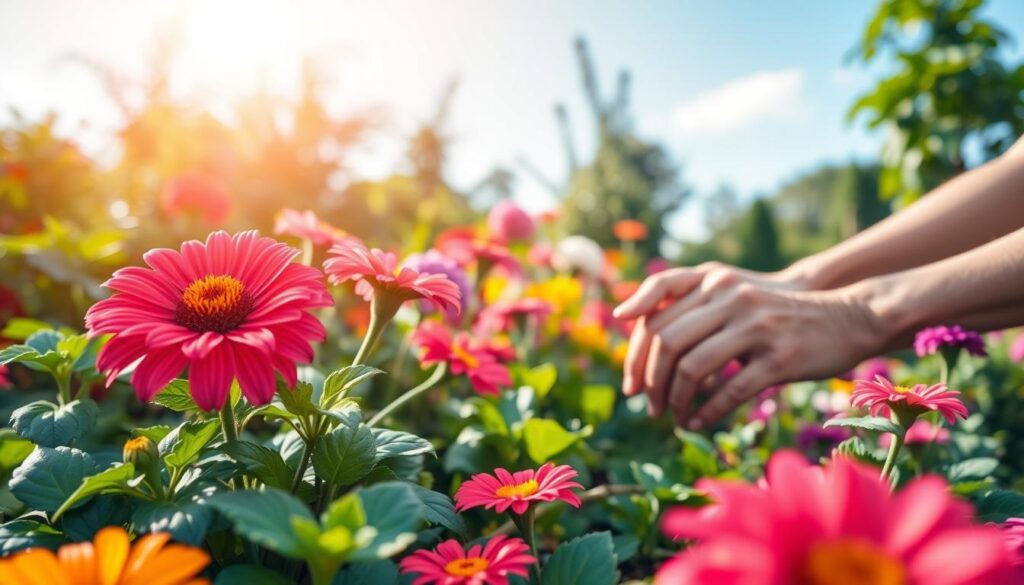
Combating Loneliness through Community Gardens
For many seniors, loneliness and social isolation can be a significant challenge. However, community gardens offer a remarkable solution, providing a platform for older adults to connect, interact, and form meaningful relationships. By participating in these shared gardening spaces, seniors can not only enjoy the physical and mental health benefits of gardening but also the invaluable social rewards.
Community gardens serve as hubs of social interaction, where seniors can exchange knowledge, share stories, and forge new friendships. The Grounded Women Gardening (GWG) group, for example, has been running for three years, facilitating socialization and community building among women of all ages, including those facing mental health challenges, anxiety, depression, and loneliness. The group offers a safe, supportive environment where participants can engage in gardening activities without the pressure to talk, allowing them to find comfort and companionship at their own pace.
Furthermore, research has shown that social engagement through activities like community gardening can have a significant impact on the emotional well-being of seniors. Studies suggest that up to 90% of seniors who stay socially active report improved emotional well-being, and those who engage in social activities such as community gardening can experience a 15% increase in their quality of life.
By fostering a sense of community and reducing feelings of isolation, community gardens play a crucial role in combating loneliness among older adults. As seniors come together to nurture their shared garden, they not only reap the physical and mental benefits of gardening but also cultivate meaningful connections that can enrich their lives and well-being.
| Benefit | Percentage |
|---|---|
| Seniors who experience improved emotional well-being by staying socially active | 90% |
| Increase in quality of life for seniors engaging in social activities such as community gardening | 15% |
| Seniors who benefit from the physical health advantages of gardening, such as improved flexibility and strength | 75% |
| Seniors experiencing stress reduction through gardening activities | 80% |
Gardening as a Form of Gentle Exercise
While gardening may not seem as intense as traditional exercise, it is considered a moderate-intensity activity that can provide significant physical activity benefits for older adults. Gardening tasks like digging, planting, and weeding can help burn calories, improve mobility, and strengthen muscles and joints. Incorporating gentle stretching and range-of-motion exercises before and after gardening can further enhance the physical activity benefits of gardening for elderly and reduce the risk of injury.
Burning Calories and Improving Mobility
According to research, gardening exercises for seniors can contribute to lower blood pressure and effective memory care, particularly for those with Alzheimer’s or memory impairments. Additionally, gardening activities support the maintenance and improvement of motor skills, sensory awareness, and dexterity in older adults. Group gardening activities also promote social benefits, enhancing emotional, intellectual, and physical wellness.
Gardening is known to relieve stress and boost the immune system in seniors. It’s advised for older adults to consult their primary care physician before engaging in heavier gardening activities, and stretching before gardening can help prevent injuries. Staying hydrated is crucial during gardening, even in cooler weather, and seniors with outdoor or seasonal allergies should take necessary medication before gardening.
| Benefit | Description |
|---|---|
| Calorie Burning | Gardening tasks like digging, planting, and weeding can help burn calories and support weight management in seniors. |
| Improved Mobility | Gardening can boost balance, coordination, and overall physical function, enhancing seniors’ mobility and independence. |
| Muscle and Joint Strength | Gardening activities can strengthen muscles and joints, supporting overall physical well-being in older adults. |
The Mindfulness of Gardening
Gardening can be a profoundly mindful activity for seniors, engaging all the senses and requiring close attention to the needs of plants. The rhythmic, repetitive motions of tasks like weeding, watering, and pruning can help older adults feel grounded in the present moment, reducing stress and anxiety.
The sense of accomplishment and control that comes from nurturing a thriving garden can also boost self-esteem and overall well-being. Studies have shown that gardening may reduce the risk of dementia by up to 36% and that interacting with plants can increase self-esteem and reduce feelings of anger, sadness, and stress.
Gardening tasks can also help protect and promote hand strength, particularly as individuals age. Low-to-moderate physical exertion while gardening can decrease cholesterol levels, blood pressure, and oxidative stress in the body. Furthermore, spending time in nature, such as through gardening, can help reduce stress levels and induce feelings of calm.
The therapeutic benefits of gardening for seniors go beyond just physical health. Gardening activities work together to reduce cortisol levels, which is beneficial to overall health. The mindfulness and sense of purpose that gardening provides can be especially valuable for older adults, helping to combat loneliness and promote a positive outlook on life.
Whether tending to a small container garden or immersing oneself in a larger outdoor plot, the mindfulness of gardening can be a transformative experience for seniors. From the tactile pleasure of working with soil to the visual delight of watching plants thrive, gardening engages the senses and grounds the mind in the present moment.
Boosting Vitamin D Levels through Sun Exposure
Gardening offers a unique opportunity for seniors to soak up the sun’s rays and reap the benefits of increased vitamin D production. When the skin absorbs sunlight during outdoor activities like gardening, it triggers the body to synthesize this essential nutrient, which is crucial for calcium absorption and bone health.
Vitamin D deficiency is common among older adults, often due to reduced skin production efficiency, limited mobility, and decreased appetite as they age. However, moderate, regular sun exposure while gardening can help boost vitamin D levels and support overall health.
According to the Centers for Disease Control and Prevention (CDC), gardening is recommended as a way for seniors to achieve the recommended 150 minutes of moderate-intensity aerobic activity per week, promoting physical health and fitness. Additionally, horticultural therapy has been recognized as effective in managing chronic pain, improving mood, and enhancing physical rehabilitation for older adults.
While the benefits of sun exposure are clear, it’s important for seniors to use sun protection, such as sunscreen and protective clothing, to avoid excessive exposure and potential skin damage. By finding the right balance, older adults can enjoy the therapeutic and health-boosting effects of gardening while keeping their vitamin D levels in check.
| Vitamin D Sources | Benefits for Seniors |
|---|---|
| Sunlight exposure | Boosts vitamin D production, contributing to bone health and preventing osteoporosis and fractures |
| Fortified foods (margarine, milk, cereal) | Provides an alternative dietary source of vitamin D for older adults with limited sun exposure |
| Oily fish (salmon, herring, mackerel) | Rich in vitamin D, helping to maintain adequate levels |
By incorporating regular, moderate sun exposure during gardening activities, seniors can reap the numerous benefits of vitamin D and support their overall health and well-being.
Gardening for Seniors with Dementia
Gardening can be an incredibly rewarding and therapeutic activity for seniors with dementia. The tactile experience of working with plants, the vibrant colors, and the calming nature sounds can help reduce agitation and promote relaxation.
Sensory Stimulation and Purpose
Outdoor gardening provides sensory stimulation, such as smells, touch, and sounds that can evoke happy memories, calmness, and mood-boosting effects for those with dementia. Engaging in physical activities like gardening can also stimulate the senses and memory in individuals affected by the condition. Simple gardening tasks like planting seeds, pruning shrubs, and maintaining water features can offer a sense of accomplishment and purpose.
Caregiver Support and Involvement
Caregivers can play a vital role in supporting seniors with dementia through the gardening process. Involving them in the planning and design of the garden, as well as providing assistance and encouragement throughout the gardening activities, can significantly enhance the experience. Creating a safe and accessible garden space, with level paths, non-toxic plants, and avoiding harmful chemicals, can also ensure that seniors with dementia can enjoy the benefits of gardening for seniors with dementia.
By incorporating therapeutic horticulture for Alzheimer’s patients and gardening activities for elderly with memory loss, caregivers can help seniors with dementia find a sense of purpose, reduce stress and anxiety, and improve overall well-being.
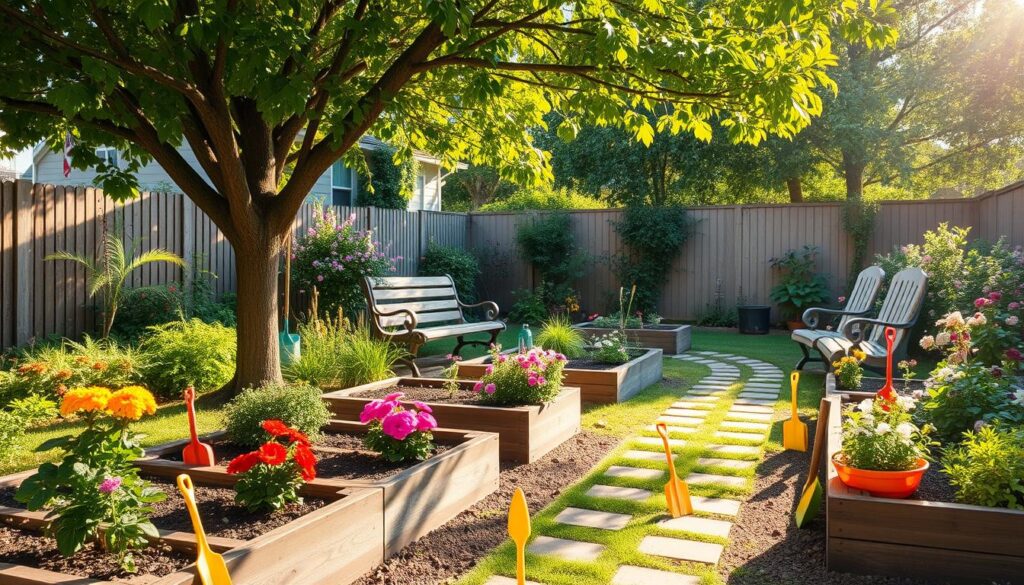
| Benefits of Gardening for Seniors with Dementia | Key Considerations |
|---|---|
| Sensory stimulation and mood-boosting effects Increased sense of accomplishment and purpose Reduced stress, agitation, and anxiety Improved memory, communication, and social interaction | Creating a safe and accessible garden space Involving caregivers in the gardening process Incorporating familiar and non-toxic plants Providing assistance and encouragement throughout |
Adaptive Gardening Tools and Techniques
Gardening is a beloved pastime for many older adults, offering a wealth of physical, mental, and emotional benefits. However, as we age, our bodies can undergo changes that may make traditional gardening tasks more challenging. Fortunately, a range of adaptive tools and techniques can help seniors continue to enjoy the joys of cultivating their own gardens.
Raised beds and vertical gardening are two popular solutions. Raised beds, which can be built to a comfortable height, reduce the need to bend and stretch, while vertical gardening systems allow plants to grow upward, minimizing the need for stooping. Ergonomic tools with long handles or curved designs can also help seniors garden with greater ease and comfort, reducing strain on the body.
Protective gear, such as knee pads, and comfortable seating options, like rolling garden chairs, can further enhance the gardening experience for older adults. Additionally, incorporating drip-irrigation systems and soaker hoses can eliminate the need for manual watering, which can be physically demanding.
| Adaptive Tool | Key Features | Benefits for Seniors |
|---|---|---|
| HomeBuddy Garden Auger | 2-inch and 3-inch garden drill bits | Easier hole-digging for planting |
| Miracle-Gro 4-in-1 Garden Stool | Lightweight at 4.4 pounds, with tool storage | Provides seating and storage for gardening tasks |
| Rolling Gardening Chair Cart | 360-degree swivel, adjustable height | Reduces strain and fatigue during gardening |
| Gardener’s Friend Pruning Tools | Ratchet mechanism, ergonomic design | Easier grip and use for those with weak hands |
| Vita Liberty Accessible Planter | Built around ADA standards, knee-high access | Allows for comfortable gardening for seniors |
By incorporating these adaptive gardening tools and techniques, older adults can continue to reap the numerous benefits of gardening, from improved physical health to enhanced mental well-being. With a little creativity and the right tools, seniors can enjoy the fruits of their labor and maintain their beloved hobby for years to come.
Container Gardening: A Space-Saving Solution
For seniors with limited outdoor space, container gardening can be an excellent solution. Growing plants in pots, planters, or hanging baskets allows older adults to enjoy the benefits of gardening without the physical demands of maintaining a large plot. Container gardening requires less bending and lifting, making it more accessible for those with mobility challenges. By selecting low-maintenance, easy-to-care-for plants, seniors can create a thriving garden in a small space.
April is National Gardening Month, and container gardening for seniors is gaining popularity. Seniors with mobility or dexterity challenges find gardening using containers less painful, as the raised beds and lightweight materials reduce the need for heavy lifting and physically demanding tasks. This makes small-space gardening for elderly a practical and rewarding activity.
Container gardens offer a variety of plant selections, including flowers, herbs, vegetables, and small fruit trees. Seniors can grow their own fresh produce, providing a nutritious and enjoyable hobby. Easy gardening for older adults also offers sensory stimulation through sight, smell, and touch, which can have a positive impact on mental and emotional well-being.
| Container Type | Advantages | Suitable Plants |
|---|---|---|
| Fabric Grow Bags | Lightweight, affordable | Herbs, salad greens, root vegetables |
| Plastic Pots | Lightweight, durable | Flowers, herbs, small vegetables |
| Clay Pots | Durable, aesthetic appeal | Mediterranean herbs, succulents |
| Hanging Baskets | Save space, add visual interest | Trailing flowers, herbs, small fruits |
When setting up a container gardening space for seniors, consider leaving ample walking space between containers, placing pots within arms’ reach, and incorporating stand-up gardens to avoid bending. By starting small and gradually expanding their container garden, older adults can enjoy the rewards of this accessible and rewarding hobby.
The Social Aspect of Community Gardens
Participating in a community gardening for seniors can provide valuable social opportunities for older adults. Gardening alongside neighbors and fellow enthusiasts allows seniors to share knowledge, swap gardening tips, and form new connections. The communal aspect of community gardens can help combat loneliness and isolation, while also fostering a sense of belonging and purpose.
According to research, social benefits of gardening for elderly include strengthening social ties, promoting social resilience, and motivating community members. In fact, by 2050, the senior population in the United States is projected to double in size to 83 million adults aged 65 and older. Community gardening can play a vital role in supporting this growing demographic and addressing issues like social isolation and food insecurity.
Many senior gardening clubs have found that participating in a communal growing space not only provides opportunities for physical activity and nutritious food production but also fosters a sense of community. Seniors can share their gardening expertise, learn from each other, and engage in meaningful social interactions, all while cultivating a thriving garden.
| Key Benefits of Community Gardening for Seniors | Impact |
|---|---|
| Combating Loneliness and Social Isolation | Seniors facing food insecurity are 60% more likely to experience depression and 53% more likely to have a heart attack. Community gardening has been found to alleviate these issues. |
| Fostering a Sense of Community and Belonging | Participating in a shared gardening space allows seniors to connect with their neighbors, share knowledge, and feel part of a supportive community. |
| Promoting Physical Activity and Healthy Nutrition | Community gardening provides opportunities for physical activity, access to fresh produce, and improved nutritional status, which can positively impact overall health and well-being. |
By cultivating a thriving community garden, seniors can not only enjoy the therapeutic benefits of gardening but also reap the social rewards of connecting with like-minded individuals. This holistic approach to community gardening for seniors can make a meaningful difference in the lives of older adults, fostering a sense of purpose, well-being, and belonging.
Improving Nutrition with Homegrown Produce
For seniors, the benefits of growing their own fruits, vegetables, and herbs extend far beyond the simple joy of gardening. Homegrown produce can be a game-changer when it comes to improving nutrition and overall health. Compared to store-bought options, homegrown fruits and veggies are often fresher and more nutrient-dense, providing older adults with a reliable source of healthy, flavorful foods.
Studies have shown that community gardening can lead to a significant increase in vegetable intake among participants. In one study, the average increase in total vegetable consumption from baseline to harvest was 0.63 servings (p=0.047), while the increase in garden vegetable intake was 0.67 servings (p=0.02). Additionally, access to a home garden was associated with a 30% greater likelihood of acquiring vegetables.
The process of cultivating and harvesting one’s own food can also have a positive impact on mental and emotional well-being. Gardening has been linked to lowered levels of anxiety, stress, and depression, as well as better recovery from surgery and a boost to the immune system. The mindfulness and sensory stimulation involved in gardening can encourage healthier eating habits and a deeper appreciation for natural flavors.
| Statistic | Value |
|---|---|
| Average age of participants | 41 years |
| Percentage of female participants | 82% |
| Percentage of Hispanic participants | 34% |
| Increase in total vegetables intake from baseline to harvest | 0.63 servings (P = 0.047) |
| Increase in garden vegetables intake from baseline to harvest | 0.67 servings (P = 0.02) |
| Association of community gardening with eating seasonally | P = 0.02 |
| Percentage greater likelihood of acquiring vegetables with home garden access | 30% |
By growing their own produce, seniors can enjoy the benefits of fresher, more nutritious foods while also reaping the mental and emotional rewards of gardening. Whether it’s a small backyard plot or a shared community garden, the opportunity to cultivate one’s own food can be a valuable asset for improving nutrition and overall well-being in the golden years.
Conclusion
Gardening offers a wealth of physical, mental, and social benefits for older adults, making it a highly rewarding activity for senior green thumbs. By adapting the gardening experience to accommodate changing needs and abilities, seniors can continue to enjoy the joys of cultivating a thriving garden well into their golden years. From improved mobility and nutrition to reduced stress and increased social engagement, the multifaceted advantages of gardening for the elderly are clear.
Studies have shown that the majority of gardening tasks are classified as low-to-moderate intensity physical activity, and gardening is the second most commonly reported leisure-time physical activity among older adults after walking. Prior research has also demonstrated that gardening interventions can lead to improved diet and nutrition, decreased blood pressure, increased physical activity, and reduced weight gain/body mass index.
With the right support and resources, gardening can become a cherished pastime that enhances the overall well-being of seniors. By incorporating adaptive tools and techniques, creating accessible gardening spaces, and fostering a sense of community, older adults can continue to reap the countless benefits of this rewarding hobby. As the evidence overwhelmingly suggests, gardening is a powerful tool for promoting healthy aging and improving the quality of life for seniors.
FAQ
What are the health benefits of gardening for seniors?
Gardening can provide numerous health benefits for older adults, including burning calories, improving bone health, and strengthening the immune system. It can also lower the risk of dementia by 36%.
How can gardening benefit the mental and emotional well-being of seniors?
Gardening offers mental and emotional rewards, such as reducing stress and anxiety, boosting mood, and providing a sense of purpose and accomplishment.
What adaptations can make gardening more accessible for seniors?
To make gardening more accessible, consider using raised beds and vertical gardening techniques, as well as ergonomic tools with long handles or curved designs to reduce strain and maximize efficiency.
What types of plants are best suited for senior gardens?
When selecting plants, look for low-maintenance, hardy options that are easy to care for, such as succulents, herbs, and flowering perennials.
How can seniors maintain the long-term health and beauty of their gardens?
Establishing a consistent watering and feeding schedule, along with regular pruning and deadheading, can help ensure the long-term health and beauty of a senior’s garden.
How can community gardens benefit older adults?
Community gardens can provide a valuable social outlet for seniors, offering opportunities to interact with neighbors, share knowledge and experiences, and form new connections.
Is gardening considered a form of exercise for seniors?
Yes, gardening is considered a moderate-intensity activity that can help burn calories, improve mobility, and strengthen muscles and joints for older adults.
How can gardening promote mindfulness for seniors?
Gardening encourages mindfulness by engaging all the senses and requiring close attention to the needs of plants, helping seniors feel grounded in the present moment.
What are the benefits of sun exposure during gardening for seniors?
When seniors’ skin absorbs sunlight while gardening, it prompts the body to produce vitamin D, which is essential for calcium absorption and bone health.
How can gardening be beneficial for seniors with dementia?
Gardening can provide sensory stimulation and a sense of purpose for seniors with dementia, helping to reduce agitation and promote relaxation.

